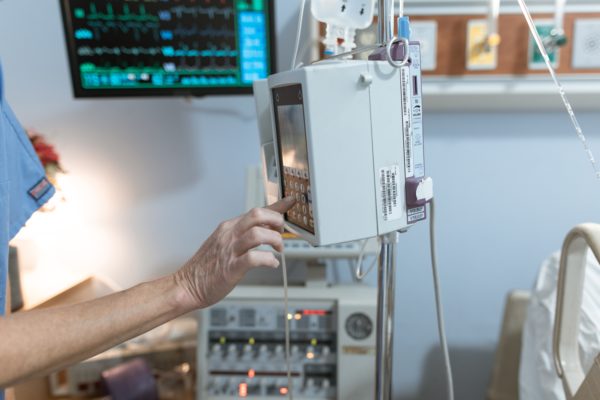From this article, you are going to find out the essential information you need to know about Intelligent Automation (IA) in Healthcare, including its role in the future of health care, how it can cut healthcare provider and payer’s costs, how to integrate it, what additional benefits it can bring, and how Epeek company can help you implement it.
What is Intelligent Process Automation in Healthcare?
Intelligent automation also referred to as hyperautomation, implies the use of artificial intelligence (AI) for the processes usually implemented by human resources. It is a multifaceted architecture that comprises the use of AI, business process management (BPM), and robotic process automation (RPA) in order to optimize decision-making in an organization to make it more scalable and efficient.
AI is created to emulate human intelligence in certain ways. The learning of AI is implemented through Machine Learning (ML), a fast-developing branch of AI responsible for the emulation of human learning through the analysis of large data volumes. In the healthcare system, AI and ML can be used to process medical records, prescription refills, online support, revenue, cost, medical billing, and many others.
The Role of Intelligent Automation in Healthcare
At the peak of the COVID-19 pandemic, it became clear that health care systems internationally are terrifyingly underprepared and understaffed. This is happening even in this age of progress when numerous medical breakthroughs and revolutionary patient care and disease management measures are implemented. The reason for that is that the majority of back-office processes and protocols used by the health care system are notoriously outdated and unable to meet modern-day healthcare demand. The only way to solve this problem is by implementing intelligent automation best practices.
The solution mostly implemented today is Robotic Process Automation in healthcare (RPA). It is used to fill in such gaps as managing patient data, filling in forms, etc. The undoubted benefit of RPA is cost reduction as the system can mimic “almost any predictable human interaction.” However, RPA tools cannot solve the problem as a whole. RPA can be used only for the automation of repetitive processes; it is so-called attended automation. The main benefit of healthcare intelligent automation is the replacement of human labor, or, unattended automation, as it enables fully automated intelligent document processing.

RPA can only use set logic and inputs, but AI creates its own logic, relieving people from the information processing and processes overload more efficiently. The ideal future for health care is the combination of RPA and AI to create a fully autonomous process so that healthcare professionals could focus on patient care exclusively.
To date, it is estimated that implementation of RPA not only streamlines processes and enhances efficiency but also reduces costs by up to 75%. In practice, the cost of one human-processed insurance claim costs $4, while the same process implemented by RPA reduces the cost to $1 per claim. Intelligent process automation in healthcare can lower the costs even more dramatically.
The main differences between RPA and IA in short:
Intelligent Automation for Healthcare Providers Practical Use
Patient care being the main aspect of healthcare commonly suffers from the need of healthcare organization staff to spend a lot of time processing electronic health records (EHR), working with medical bills, extracting data from other medical applications, and so on.
Intelligent automation in healthcare organizations can be a solution not only to such problems as EHR processing but also medical billing, check-in-and-visit, predictions of health trajectories, and many others.
To implement Intelligent Automation, a provider must map the administrative workflows with the clinical workflows. An Intelligent Automation workflow is then built on any manual process. It creates structured data interaction that requires inter-linking of data from these two sources when extracted/injected, interpreted, analyzed, and executed.
An example of IA data interlinking for healthcare providers:

The IA then can come up with the following solutions:
- Creating digital clinical notes
- Managing drug dispensary automation
- Prediction of health trajectories
- Control over following pre-filled regulatory compliances
- Management of automatic discharge procedures
- 27/4 virtual intelligent bot support
- Population health management
- Check-in with insurance data
Intelligent Automation for Healthcare Payers Practical Use
Medical payers are represented by the organizations that provide health plans such as Medicare and Medicaid. These organizations set service rates, collect payments, and provide payment for the medical service offered.
Although it may seem that the health service plan provider’s customers seek cost reduction the most, surveys indicate that they are more interested in highly customized plans. This creates additional pressure on the healthcare payers and requires them to be more adaptive and flexible. The only feasible way to win in this situation is to use automation, and specifically, implement intelligent process automation in healthcare. This includes the implementation of solutions for tracking, measuring, and forecasting productivity for each implemented feature in real-time.
For this, the health care payer organization using intelligent automation has to create a map to interlink the databases that need to be analyzed and used by AI:

The IA then can come up with the following solutions:
- Product strategies
- Straight through processing
- Chatbots for enrollment, queries, etc.
- Bot-driven business analytics
- Automated status triggers
- Preventive health programs
- Risk analysis
Consider Empeek Your Trusted Partner
Empeek company is an expert healthcare IT partner that provides process digitization services and has experience handling a variety of projects, from small apps to enterprise-level systems, including implementation of intelligent automation in the healthcare industry.
In our portfolio, we already have several health care projects such as:
- The Screening Tool. It is survey software with a fully automated patient referral system. It allows screening Medicaid and Medicare beneficiaries for social determinants of health (SDH).
- Remote Patient Monitoring Solution Development. This technology allows people to privately share their health data with their doctors from the comfort of their homes. It also allows doctors have a deeper understanding of a patient’s disease progression.
- Wireless medical monitoring in real-time. This technology medical monitoring system allows capturing, analyzing, and decoding patients’ vital signs and various psychological parameters in real-time. With app users ranging from hospitals and other medical care providers to trained athletes to simply health-conscious people, this IoT-based solution won the hearts of many users with its seamless user experience.
- Drug Testing System. It is a comprehensive system for accessing, tracking, and managing drug testing data. The system was developed for the US-based company specializing in drug testing and background screening for over 1,000 residential communities, defense contractors, and companies in the Transportation and Oil & Gas industries.
- Mental Wellness App. The project is a mental wellness program that strives to eliminate the stigma around mental health care. Personal and accessible, the program is based on years of research. Equipping people with hands-on techniques aims to help them relieve stress and anxiety, and live the life they want.
Final Thoughts
Intelligent process automation in healthcare requires the participation of a whole team of experts in IA, including data scientists, machine learning, testing, and other specialists. Empeek has a special 5-step methodology to enable Intelligent Automation in healthcare:
1. Plan:
- Definition of business metrics
- Assessing, targeting, and prioritizing processes to be optimized and automated.
- Identification of optimal workflows and tools to use
- Proposition of automation plan
2. Analysis:
- Creation of proof of concept (POC) and technical flows
- Conduction of tests and live trials
- Collection of feedback and mapping it with business metrics
3. Optimization
- Establishment of Center of Excellence
- Capturing impact and creation of blueprints for future structures
- Identification of patterns for AI/ML to integrate new capabilities
4. Acceleration
- Expansion of automation applications to different processes
- Implementation of efficiency-driven AI automation
- Adaptation of design thinking for future
5. Enabling Full Intelligent Automation
- Engineering and re-engineering processes by adopting IA
- Deployment of intelligent bots for all possible processes
- Application AI to unstructured information (including human-operated chat conversations, audio calls, etc.)
- Implementation of analysis of data for the improvement of AI performance.
We hope that this article helped you understand the benefits of Intelligent Automation in healthcare for different interested parties. It indeed can significantly improve the quality of patient care and substantially cut the need for additional human resources and financial burden. However, it is important to understand that to implement intelligent Automation successfully, a team of specialists is required to work with the databases mapping and interlinking, as well as testing and introducing the best available practices.








